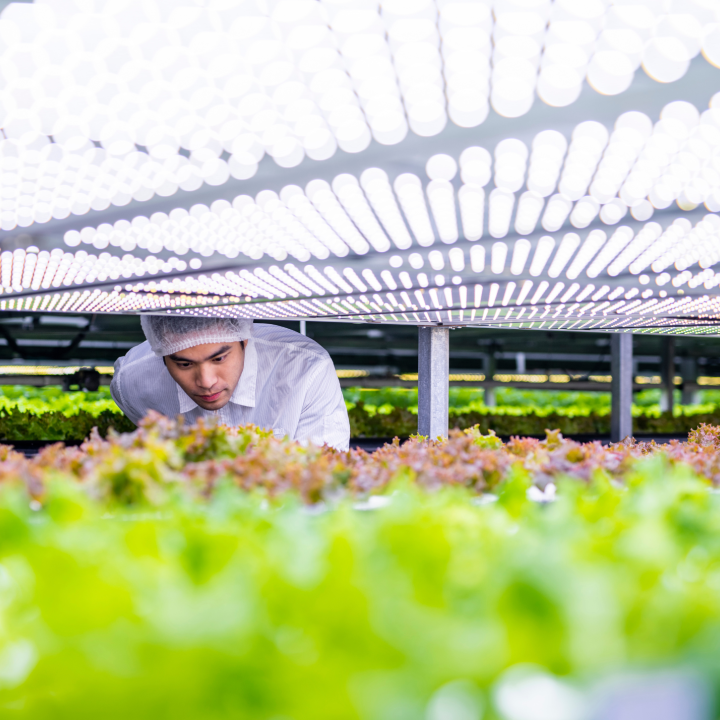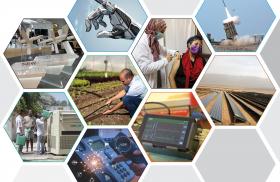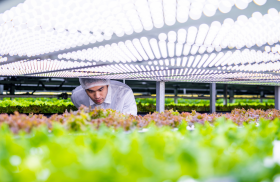
Israeli Startups Are Leading Efforts to Combat Food Insecurity

Part of a series: Asset Test
or see Part 1: Asset Test 2021: How the U.S. Can Keep Benefiting from Its Alliance with Israel
From barn owls and crop sensors to 3D-printed steak and animal-free baby formula, Israeli firms are finding—and exporting—innovative ways to address challenges in the agricultural and food sectors.
Conflict, disease, and natural disasters continue to threaten the availability of resources worldwide. Over the coming decades, the World Bank predicts that global food production will have to increase by 70 percent or more to meet demand. Innovation is required to formulate effective, environmentally safe ways to meet future needs.
In many different fields, the “Startup Nation” is answering these challenges. Israel, a country roughly the size of Vermont and only about 0.1 percent of the world’s population, is leading the food technology revolution. Jerusalem and Tel Aviv rank fourth in the world for agriculture technology (AgTech) startups, which aim to establish better farming methods, limit food waste, and create sustainable alternatives to traditional farming.
Precision
A new report ranks Tel Aviv as the world’s second-best city for science and clean technology innovation, just behind Silicon Valley. An important area of clean technology is precision agriculture, which involves technology or analysis tools that aim to increase crop yield and save resources. A number of Israeli startups are using drones to assess how trees are performing, which helps farmers get more out of their land. Across Africa and Asia, farmers are utilizing this technology to grow a wide variety of foods more efficiently, including macadamia nuts, almonds, oranges, lemons, and apple trees.
Similarly, Israeli-invented drip irrigation technology uses 70 percent less water and can dramatically increase the number of crops harvested by 150 percent compared to traditional irrigation methods.
Limiting Food Waste
Ukraine and Russia produce about a third of the world’s wheat, and the ongoing war has raised grain prices and stoked fears of a global shortage. As a result, finding ways to conserve available grain resources has become crucial. Currently, up to 60 percent of harvested grain is lost before it ever reaches the market. Israeli scientists are developing cheaper and safer technologies for improved food storage in over 100 countries that will effectively increase their overall supply.
More broadly, Israeli companies are bringing powerful crop sensor equipment to farmers around the world, providing them with tools and training to better monitor a wide range of crops’ activities and minimize waste. An Israeli software system sends critical data directly to farmers’ phones, which helps them keep a closer eye on soil conditions and other factors. This technology has become popular on large farms in the United States, encouraging the Tel Aviv-headquartered company to open an office in San Francisco.
The United States and Israel have also been working together to perfect gene-editing technology that makes growing food easier and safer. For instance, Israeli entrepreneurs are leading efforts to produce black-eyed peas using methods that are resilient to climate change. And as the medical marijuana industry grows, Israel is ready to meet the increased demand. An Israeli company recently started exporting cannabis grown with its cutting-edge gene technology to the United States to help treat PTSD, anxiety, and other conditions.
Got Beef?
The meat industry has a vast impact on health, the environment, and the global economy. Research agrees that humans need to reduce meat consumption by more than 70 percent. From 3D-printed steak to producing “meat” derived from cranberries and cultured cells, Israel is leading the way in inventive, meat-free alternatives. Israel has the highest number of plant-based startups with commercial product already being sold on the market. This is noteworthy because plant-based meat substitutes could make up 25 percent of the global meat market by 2040.
The business of cultured meats is also expanding in popularity, and Israel is poised for success in this nascent market. An Israeli company was just awarded the sector's largest-ever investment in the hope that it will expand the firm’s production to set up operations in the United States and other markets.
Got Milk?
Sales of plant-based alternatives such as oat, soy, and almond milk have grown 54 percent since 2018. Yet while an animal-free diet is better for the environment, many of these popular alternatives have negative effects of their own. Israeli startups are working on alternative production methods that can provide dairy-free alternatives without contributing to the climate crisis.
The old saying “Problems are only opportunities in work clothes” is being put into practice by an Israeli company that dove in to tackle the baby formula shortage in the United States. Israeli scientists are working on innovative alternatives made from animal-free milk.
The Pesticide Problem
Although pesticides are essential in farming, they can sometimes do more harm than good. Israeli companies are working on smart ways to lessen dependence on chemical pesticides by using natural, organic methods such as tiny mites, barn owls, and “good viruses.”
A researcher at Tel Aviv University has been using barn owls, which can eat up to 6,000 rodents a year, as an alternative to traditional pest control methods since the early 1980s. Today, this project operates in the Palestinian Authority, Jordan, Morocco, Cyprus, and Switzerland. Other countries in the region (e.g., the United Arab Emirates, Egypt, and Tunisia) are looking to implement the “Barn Owl Project” in the near future.
Regional Cooperation
As desert conditions become more extreme, countries require new solutions to improve desert farming. Israel leads the world in growing high-quality produce in such conditions and exporting AgTech for desert farming.
For example, since the signing of the Abraham Accords in 2020, Israel has finalized multiple research and development deals with the UAE aimed at improving farming in deserts. And this May, Israel and Morocco signed thirteen agreements relating to AgTech. An Israeli company specializing in precision agriculture announced this year that it plans to share its state-of-the-art technology with Moroccan farmers.
Israel has also expanded its technologies to reach countries outside the Abraham Accords. In June of this year, businesses in Israel and Saudi Arabia signed huge desert agriculture deals that will incorporate Israeli hydro-technology and other systems essential for farming in dry climates. In Ethiopia, Israel sent state-of-the-art drone technology to help target pervasive species such as the desert locust, which has ravaged farms and contributed to serious food shortages in East Africa. This problem also needs to be addressed in parts of Asia and the Middle East.
Elsewhere, Israel is helping to advance Palestinian agriculture by supplying training and enrichment in crops such as pineapples, strawberries, peppers, and baby cucumbers. As Samir Moaadi, the Israeli Civil Administration’s agricultural coordinator for the West Bank, stated in 2019, “Agricultural cooperation between Israel and the Palestinians is growing stronger. We will continue giving Palestinian farmers the deep professional knowledge of agriculture required, so that the sector will grow, will strengthen the Palestinian economy, and will thus help stabilize security in the region.” Other partnerships and projects include developing fish ponds and an environmentally safe alternative to pesticides.
This article is an update of the Washington Institute report Asset Test 2021: How the U.S. Can Keep Benefiting from Its Alliance with Israel, by Michael Eisenstadt and David Pollock.











